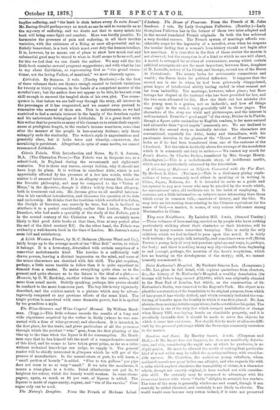The Notary's Daughter. From the French of Madame Leoni d'Aulney.
The House of Penaruan. From the French of M. Jules Sandeau. 2 vols. By Lady Georgians Fullerton. (Bentley.)—Lady Georgians Fullerton has in the former of these two tales adapted and in the second translated French originals. In both she has achieved a very decided success. The French system of marriage affords con- siderable scope for the ingenuity of a novelist, even when he respects the insular feeling that a woman's love-history should not begin after her marriage. It is true that in the first of these stories the maxim is not observed, but the exception is of a kind to which no one will object. A match is arranged for motives of convenience, among which certain political arrangements are the most important, between Rose, daughter of M. Lescalle, notary of La Ciotat, and George, second son of the Baron de Croixfronds. The notary looks for aristocratic connections and wealth ; the Baron looks for political influence. It happens that the second son is one in whom he had been grievously disappointed, great hopes of intellectual ability having ended in what seemed not far from imbecility. The marriage, however, takes place ; but Rose betrays her disgust at the husband who has been provided for her, and the two seem alienated for life. How she finds out her mistake (for the young man is a genius, not an imbecile), and how all things come right in the ond, is very gracefully told in those pages. The characters of the story are vivid and picturesque, and the interest is well sustained. Even the good angel "of the story, Denise de la Pined°, though a figure quite unfamiliar to English readers, is far more natural and attractive than "good angels" commonly arc. We are inclined to consider the second story as decidedly inferior. The characters are conventional, especially the Abbd, lanky and threadbare, with his passionate devotion to the glories of the "House of Penarvan," who looks as if ho had been transferred from one of the cartoons of the Charivari. Yet the tale is decidedly above the average of the novelettes which it is commonly our duty to notice.— We cannot say much for Irene's Dower, by Charles Deslys, translated by Mrs. George Henry. (Remington.)—This is a melodramatic story, of indifferent merits, which are not particularly enhanced by the translation.


































 Previous page
Previous page